Is Europe giving up its Values?
2018. szeptember 05., szerdaWhat can we learn from research studies on immigration? In this day and age, is any and all movement of people happening to the detriment of the Christian world? What religious and cultural differences exist between Europe and the Islamic world? It is such questions that Hanga Horváth-Sántha, senior researcher at the Migration Research Institute, and Nikoletta Incze, researcher at the Center for the Study of Political Islam deal with during their work. They were present at the Conference of Reformed Intellectuals in Szárszó, where we talked to them about the current situation regarding Islam and Western culture.
The Conference of Reformed Intellectuals opened its gate once again in Balatonszárszó from 23-26 August 2018. The conference focused on immigration and emigration, examining the role of the community, the Church, as well as the nation.
– Today’s communication is dominated by the issue of refugees, with more and more people becoming interested in the reasons and root causes. The two of you, however, have been conducting research in this field for several years. How did the crisis of the relations between two different worlds become your vocation?
Hanga Horváth-Sántha: I believe it was on 11 September 2001 that the whole world changed; everyone can still vividly remember where they were and what went through their mind when they heard about the events in New York. I was confronted with terrorism for the first time on that day, and afterwards I wanted to know more about the ideology that made educated people sacrifice their own life and take others’ lives away. While researching this area, I discovered that we tend to treat with tolerance even those who want nothing to do with our tolerance and values. I grew up in Sweden and therefore have first-hand experience of our readiness to surrender ourselves: for years, our annual school-year opening ceremony was always held in a church, but then this custom was abolished so as not to offend non-Christians. I was curious to learn why the tolerance espoused by liberal democracy is synonymous with surrendering ourselves when nobody has even asked us to do so.
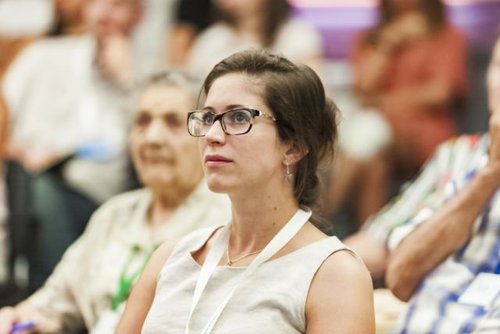
Nikoletta Incze: I have always had a strong sense of justice, having been brought up in classic liberalism, therefore I consider human rights – freedom and equality – values that are worth fighting for. 9/11 was a turning point in my life as well. At the time I was an international studies major at university, and the events in New York inspired me to write my thesis on the European integration of Muslims in Great-Britain, France and Germany. Afterwards I studied cultural anthropology and while living in England I had the chance to learn about Islam from an imam, which made me interested in separating the political and religious aspects of Islam. I have never been able to understand why today’s liberals stay silent when the law is violated by the Islam world, and I hoped to find out what lied beneath this phenomenon.
– In what ways are these initial motivations being realized in your everyday work?
Nikoletta Incze: I participated in the foundation of the Hungarian branch of the Center for the Study of Political Islam. This is an NGO based in the Czech Republic, founded through the cooperation of the so-called Visegrád Group (the Czech Republic, Hungary, Poland and Slovakia), whose aim is to educate non-Muslims about the ideology of political Islam through the main Islamic doctrinal texts.
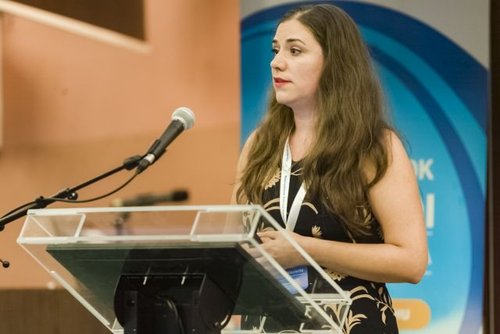
Hanga Horváth-Sántha: Although at present I am on maternity leave with my son, prior to his birth I would often work on the ground, where the real events were taking place. We did our best to reveal the processes behind the refugee crisis; we visited, among other places, the Greek-Macedonian border, the barracks of Belgrade, and we also went to Horgos, a border-crossing point between Serbia and Hungary. It was important to gain first-hand experience about the events unfolding before arriving at our conclusions. Our primary source of information has been the people involved; it is through their stories, and with the help of scientific methods, that we have produced easy-to-understand studies which can be used by anyone interested to find out more about the international situation and to interpret our findings. Our intended audience was not a select number of researchers, therefore our work could reach a lot more people.
– Having studied the international processes, what motivations or reasons do you perceive behind the refugee crisis?
Hanga Horváth-Sántha: Many people are running away from armed conflicts in Iraq and Syria, but there are also a great number of people who are abandoning their homes in hope of a better life, leaving behind economic hardships and unfavourable climatic conditions. On the other hand, we have also met people motivated by nothing but adventure, such as a boy from Kabul whose parents were wealthy doctors, and yet he paid thousands of euros to a human trafficker to take him to England because he wanted to study there. There are also families who pool all of their resources to send their most “viable” child to Europe. These children then act as so-called “anchor children,” who, having obtained refugee status, can bring their family to Europe. These children are under a great deal of pressure because if they fail in their mission, they cannot return to their families; they become disowned. These examples show the complexity of these processes. Everyone has their own individual story and motivation that we need to discover.
Friday’s speakers at the Conference of Reformed Intellectuals in Szárszó included a researcher of migration and Islam, a Head of Department from the Hungarian Ministry of Foreign Affairs and Trade, a Reformed pastor and an expert on social law. The theme of the talks was the European effects of the migration wave inspired by the Arab Spring.
Nikoletta Incze: Our approach is different: we do not focus on individuals but on the ideological basis that they build their lives upon. For this, we need reliable sources, which in the case of Islam are Allah and Mohammed – everything we need to understand about Islam can be found in the doctrinal texts written about them: the Koran, as well as Mohammed’s Sira and Hadith. Muslims themselves study these same texts, quoting them as their ethics guidelines. What we can see from these texts is that Islam is not only a religion but a whole civilisation with its own political, legal and military system. We can also understand that the spreading of Islam is a basic principle of their doctrinal texts, stemming from the actions of Mohammed: today’s Muslim thinkers like to tell the story of how the Arab world learnt the name of Mohammed when he went from Mecca to Medina – he became a military leader and the initial number of his followers, 150, soon rose to 100,000. This exodus called a Hijra brought about the success of Islam, and for this reason many people today consider their journey to Europe as a similar Hijra.
– The two of you use different principles when analysing the processes taking place in Europe and the Arab world. What can these differing perspectives teach us?
Hanga Horváth-Sántha: First and foremost we can learn that fear is never a good motivator, therefore if you want to gain a perspective on reality, you should read various studies from international sources and form your own opinion. These days it is not easy to address the issue of refugees and find the middle ground, but what is even more worrying is the lack of dialogue between Central and Western Europe: it often feels as if we are interpreting certain terms in completely different ways, and we end up merely talking at, instead of talking to, each other. It is my experience that in the West religion at best means going to church during Christmas, but there is no real religious life behind this act. Islam, on the other hand, has a completely different way of thinking; their system is able to permeate and regulate all aspects of life, and the Western world, having lost its religious nature, is no longer able to grasp this – and as a result, mutual understanding is impossible.
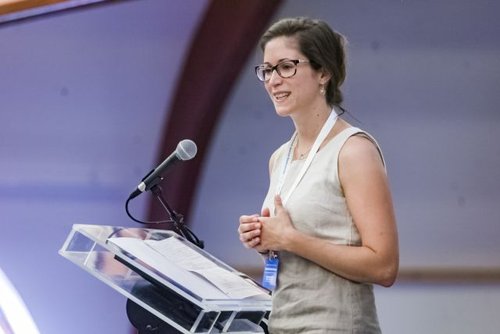
Nikoletta Incze: Europeans tend to project their own way of thinking onto others: since we believe in tolerance, we assume others will be tolerant as well. Such notions lead to an incorrect image of Islam, despite the fact that this culture is fundamentally different from ours. A good example to illustrate this is the golden rule from the Gospel According to Matthew: “in everything, do to others what you would have them do to you.” This Judeo-Christian tradition that teaches equality provides the basis for the rule of law and our constitutionality. Conversely, Islam divides the world into Muslims and non-Muslims, and the two groups will never be considered equal.
– The idea of inequality also came up during the conference. How is this manifested in the Muslim communities coming to Europe?
Hanga Horváth-Sántha: It is a serious problem that certain people and organisations encourage Muslims not to get integrated, not to have a desire to belong to the state they live in, and to continue using their own legal system, the sharia. The mechanisms promoting such ideas should be eliminated, as should the culture of impunity, since those supporting such processes are well aware of the rules of liberal democracy and know how to “fly under the radar of the law.” If we fail to stand up against this phenomenon, we will not be able to stop the process of Islamification, because we will not have any idea about what is happening within Muslim communities.
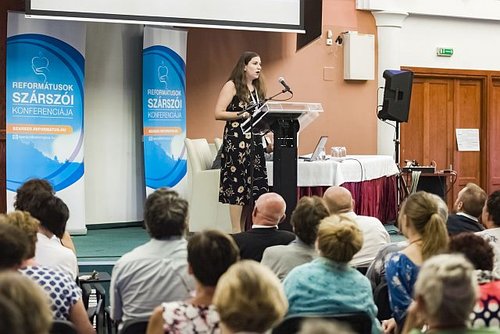
Nikoletta Incze: Europe at present allows parallel legal systems to exist, citing religious sensitivities. In England, for example, family law cases may be settled out of court on the basis of the sharia, the Islamic law. This is allowed to happen because we believe that banning such practices would mean offending religious sensitivities, but the fact of the matter is that these are political issues, and we must separate politics from religion, or else the chasm will widen even further between these parallel societies.
– What is the reality of parallel societies in today’s world?
Nikoletta Incze: Having analysed the integration processes of the past fifty years, we can conclude that the integration of Muslims is problematic. The existence of parallel societies is proof that their integration has failed. During the first wave of parallel societies, those who had acquired citizenship were joined by relatives who did not speak any foreign languages and had no qualifications – who were allowed to enter for reasons of family reunification. They began to form closed communities which are almost impossible to break out from. Just to bring an everyday example: Muslim women are under great pressure to wear a veil even if they themselves do not wish to, despite the fact that Europe is supposed to be the home of freedom. In England, a parallel legal system has developed, and although it does not deal with criminal cases, it does deal with family law: many Muslim women are not aware that in case of a divorce or domestic violence they could turn to appeal courts.
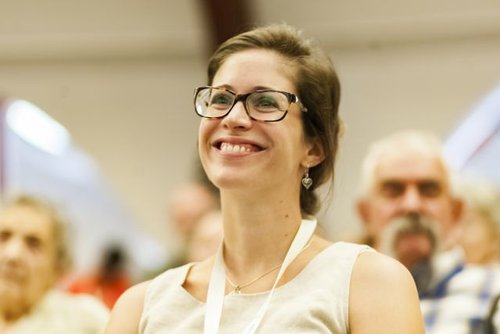
Hanga Horváth-Sántha: More and more mosques are being built in Europe, with a growing number of imams arriving on the continent, and more and more schools are operating on the basis of Islamic law – these signs suggest that the tendency will continue. However, we should also think about the “looking glass” this tendency is holding up for us to see our own reflection: who would want to belong to a hollow value system that contains nothing but tolerance? We must face our own value system because at present our identity is the fact that we have no identity.
– Glancing in this looking glass, what do you think, who are we today?
Hanga Horváth-Sántha: I would say that we are not Europeans in the sense the European Union would have liked us to become. No real European identity has been formed; we still define ourselves on the basis of nationality, whereas Muslims define themselves as Muslims regardless of their nationality. I would like to believe that in this context Hungary is still a Christian country where the ideals of community, family and nation are still important – and by nation I do not only mean the people within the borders of Hungary but the whole Hungarian community. I hope that we will still be able to take care of one another, and I am asking for God’s help to achieve that.
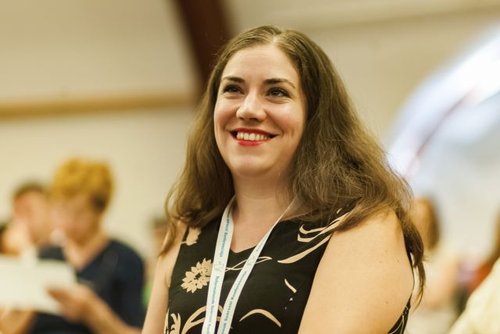
Nikoletta Incze: The merits of Europe are in its values such as solidarity, humanity, critical thinking or even secularism, which can all be traced back to our Judeo-Christian heritage and the Enlightenment. Even today, society operates on the basis of values like the freedom of religion, the freedom of speech and the freedom of opinion and expression – these are achievements whose preservation serves the development of human communities. Europe is facing a crisis of identity, and yet there are still a lot of people who want to live here. Although it is not perfect, it is functioning. What this means is that if we are able to return to our values and stand up for them, no monoculture will be able to penetrate our walls.
Interview by Zsuzsanna Farkas, photos by Richárd Kalocsai
Translation by Erzsébet Bölcskei
Contact us
Click here if you are interested in twinning.
Reformed Church in Hungary
Address: H-1146 Budapest, Abonyi utca 21.
PO Box: 1140 Budapest 70, Pf. 5
Email: oikumene@reformatus.hu
English, German and Korean language services in Budapest
Links
Recommended articles
-
Pastoral Letter in the Light of the Pandemic
Bishop Dr. István Szabó sent a pastoral letter of encouragement to the ministers serving in RCH’s congregations, expressing his gratitude for the persistence and creativity of the pastors.
-
RCH Joins in Pope's Call for Prayer
RCH published the call on congregations to join the initiative of Pope Francis, supported by ecumenical organisations, to unite in praying the Lord’s Prayer on Wednesday, 25 March, at noon.
-
English Speaking Worship Services Online
Each Sunday at 11 AM (CET) the St. Columba's Church of Scotland in Budapest, the international community of RCH invites you to join the worpship service on its facebook page.
-
Test of Humanity and Companionship
Reformatus.hu asked Dr. György Velkey, Director General of the Bethesda Children’s Hospital of RCH about the challenges of health care workers and ways of prevention against the pandemic.
-
All Church Events Suspended
In light of the coronavirus the Presidium of RCH requested congregations to suspend all church events with immediate effect. Beside restrictions, it calls for prayer, sobriety and responsibility.











